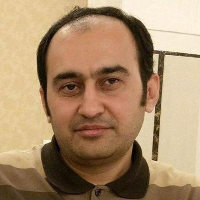محمود کرمی
-
دینداری بعنوان یکی از مهمترین ویژگی های هویتی ایرانیان، واجد تاثیرات مهم سیاسی بوده است. این تاثیرات با استناد به تحولات تاریخی معاصر، آشکارا از خلاق بودن این ویژگی هویتی در ساخت اجتماعی واقعیت های سیاسی در ایران حکایت می کند.تحقیق حاضر ضمن استوار نمودن چارچوب تیوریک خود با نظریه جنگ های فرهنگی، که حاصل کار هانتر (1991; 2006) و وثنو (1988) می باشد. بدنبال تحلیل جامعه شناختی تاثیر دینداری بر رفتار انتخاباتی در دو مفهوم گرایش رای دهی و مشارکت در انتخابات می باشد. روش تحقیق این پژوهش، پیمایش و ابزار گردآوری داده ها، پرسشنامه است. جامعه آماری پژوهش را جوانان 40-22 سال شهر زنجان تشکیل می دهند که حداقل در سه انتخابات سراسری شرکت داشته اند. از میان این جامعه آماری 377 نفر به روش نمونه گیری خوشه ای چند مرحله ای بعنوان نمونه آماری تحقیق انتخاب شده اند. برای تجزیه و تحلیل داده ها از روش های تحلیلی (رگرسیون خطی و لجستیک) استفاده شده است. نتایج بدست آمده، نشان می دهد که. میزان دینداری جوانان ، تاثیر معنی داری بر رفتار انتخاباتی آنان دارد. به گونه ای که جوانانی که میانگین دینداری بالایی دارند، گرایش به اصول گرایان داشته ومشارکت بیشتری در انتخابات نموده اند.
کلید واژگان: دینداری، رفتار انتخاباتی، گرایش رای دهی، مشارکت در انتخابات، جنگ های فرهنگیReligiosity has had important political effects as one of the most important features of Iranian identity. These effects based on contemporary and historical developments, indicate clearly the dynamic and creative nature of this identity in the social construction of political realities in Iran. The present study applies Hunter (1991; 2006) and Wuthnow’s (1988) theory of cultural wars to investigate the impact of religiosity on electoral behaviors in terms of voting tendency and participation in elections. The statistical population of the study consists of young people aged 22-40 who have participated in at least three general elections. From this statistical population, 377 people were selected by multi-stage cluster sampling as the statistical sample of the research.. Linear regression and logistics were used to analyze the data. The results show that the Degree of religiosity of youth has a significant effect on their electoral behaviors in terms of voting Tendency and participation in elections. So that, the youth who had a high average religiosity tended to the fundamentalists and Participate more in elections.
Keywords: Religiosity, electoral behavior, voting tendency, participation in elections, cultural wars -
Religiosity has had important political effects as one of the most important features of Iranian identity. These effects based on contemporary and historical developments, indicate clearly the dynamic and creative nature of this identity in the social construction of political realities in Iran. The present study applies Hunter (1991; 2006) and Wuthnow’s (1988) theory of cultural wars to investigate the impact of religiosity on electoral behaviors in terms of voting tendency.The existence of research contradictions regarding the relationship between religiosity and electoral behavior has been provided the necessity of clarifying this relationship in the form of a new research. The statistical population of the study consists of young people aged 22-40 who have participated in at least three general elections. From this statistical population, 377 people were selected by multi-stage cluster sampling as the statistical sample of the research.. logistics Regression were used to analyze the data. The results show that the Degree of religiosity of youth has a significant effect on their electoral behaviors in terms of voting Tendency. So that, the youth who had a high average religiosity tended to be more fundamentalist than reformist. Whereas, young people with low average religiosity tended to be reformists Than fundamentalist. This study contributes to Hunter (1991; 2006) and Wuthnow’s (1988) theory of cultural wars by testing it in a unique political context and therefore contextualizes the theory.
Keywords: religiosity, Electoral Behavior, voting tendency, cultural wars -
Religiosity has had important political effects as one of the most important features of Iranian identity. These effects based on contemporary and historical developments, indicate clearly the dynamic and creative nature of this identity in the social construction of political realities in Iran. The present study applies Hunter (1991; 2006) and Wuthnow’s (1988) theory of cultural wars to investigate the impact of religiosity on electoral behaviors in terms of voting tendency and participation in elections. The statistical population of the study consists of young people aged 22-40 who have participated in at least three general elections. From this statistical population, 377 people were selected by multi-stage cluster sampling as the statistical sample of the research. Linear regression and logistics were used to analyze the data. The results show that the Degree of religiosity of youth has a significant effect on their electoral behaviors in terms of voting Tendency and participation in elections. So that, the youth who had a high average religiosity tended to the fundamentalists and participate more in elections. Whereas, young people with low average religiosity tended to be reformists and were less likely to participate in elections This study contributes to Hunter (1991; 2006) and Wuthnow’s (1988) theory of cultural wars by testing it in a unique political context and therefore contextualizes the theory.
Keywords: religiosity, Electoral Behavior, voting tendency, participation in elections, cultural wars
- این فهرست شامل مطالبی از ایشان است که در سایت مگیران نمایه شده و توسط نویسنده تایید شدهاست.
- مگیران تنها مقالات مجلات ایرانی عضو خود را نمایه میکند. بدیهی است مقالات منتشر شده نگارنده/پژوهشگر در مجلات خارجی، همایشها و مجلاتی که با مگیران همکاری ندارند در این فهرست نیامدهاست.
- اسامی نویسندگان همکار در صورت عضویت در مگیران و تایید مقالات نمایش داده می شود.



